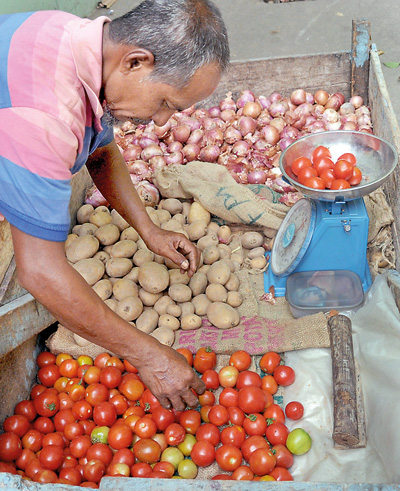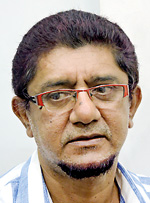News
Falling rupee brings headaches for importers and consumers
View(s):
Traders have experienced a drop in customers due to the increasing prices. Pic by Amila Gamage. Pix by Athula Devapriya
Prices of essential consumer items including dhal, rice, tinned fish and large onions have risen with the rupee’s depreciation against the dollar. The rises come despite government efforts to keep prices low. Wholesale traders in Colombo warned of more increases in coming weeks.
“Due to the depreciation of the rupee against the dollar we are left with reduced profits,” a wholesale trader in Pettah’s Old Moor Street, Mohammed Adjmal, said. “We are forced to pay more money to foreign countries when we import goods and then forced to suffer losses when we sell them in the local markets.”
He said importers who specialise in foreign grocery items were being forced to increase prices.Wholesale traders had experienced a drop in customer due to the increasing prices, Mr. Adjmal said. The point had come where wholesale prices of some goods were only two rupees less than retail prices, he added.
He said the government should set prices of imported food flexibly to cope with inflation. The President of the Colombo Traders Association, Yusuf Mohammed Ibrahim, said importers were concerned about the appreciation of the dollar. The US dollar which was around Rs 131.55 against the rupees in January rose to Rs 135 early this month.
He said importers were unable to sell some items because retail vendors were unable to cope with the price fluctuations.

Ramiyan Sanmugaraja
He too said it was impractical to fix prices of some imported items due to the shifting dollar rate.M.S.M. Zaneer, an importer of tinned fish, sprats and coriander, said he and other traders had stopped importing these items due to a massive price increase in the foreign market as well as domestic inflation.
He said tinned fish previously brought into the country for Rs. 110 now cost Rs. 130 and that the 20-rupee increase had hit traders who had been selling this fish locally at Rs. 140. “We stopped selling imported coriander because the cost has risen to Rs. 300 while the controlled price is about Rs. 260,” he said.

Yahampath Chandrasiri
Mr. Zaneer said sprats used to be imported for Rs. 260 a kilo but now cost Rs. 360. The government-controlled price of Rs. 380 made it impossible for importers to make a reasonable income, he said. Ramiyan Samugaraja, a grain dealer who imports dhal and rice said the import price of a kilo of dhal had risen to Rs. 310 from Rs. 300. He said the same dhal would be sold to the consumer for Rs. 400 with every intermediary seller having to make a profit from this.
He said that the government must find new solutions rather than claiming it had reduced prices by fixing maximum prices. The government should at least reduce taxes if the dollar stays high, he said. A keeper of a retail shop, Inusha Kumari Perera, said most brands of tinned fish cost Rs. 130, a government-controlled price, but an imported brand was being sold at Rs. 295, reflecting the current higher cost of imports.

H.M Sumanawathi
She said that though the government had reduced the price of dhal, prices were still high, as were items such as Bombay onions that had unmarked prices. She said that although the government had announced a six-rupee decrease in the price of bread, retailers had not seen any change in the cost of bread. The price of buns and pastries remained high while bread was sold at varying prices.
She said white samba rice had risen from Rs. 20 per kilo to about Rs. 2,000 for a 25kg bag while a kilo of low-quality sprats had risen by Rs. 100 to Rs. 380. Only 1kg and 400g packets of milk powder had been reduced in price as a result of government action; other packets had not decreased in price but in net weight.
Consumers complained that some items that had government price controls had escalated in cost. “Last week, when I went to the market, I found that dhal had increased by Rs. 60,” Yahampath Chandrasiri, a retired hospital worker, said. He said imported rice had also increased as well as chilli powder, which was now Rs. 75, a rise from Rs. 45.

M.S.M. Zaneer
The 60-year-old pensioner said he had limited funds and was unable to buy goods as he wished. H.M Sumanawathi from Galewela, Dambulla, said during the off-season her family depended on imported vegetables. She explained that price controls only existed in Colombo but that in other areas prices were high.
Consumer Affairs Authority (CAA) Information Director Chandrika Thilakaratne said the CAA had found that undu (oorid dhal) floor prices had increased despite controls on prices. She said the authority had called a meeting of its cost of living committee on Tuesday to discuss solutions and was in the meantime checking whether shops were selling items at blackmarket prices while ensuring that vendors could make reasonable profits from import goods.

